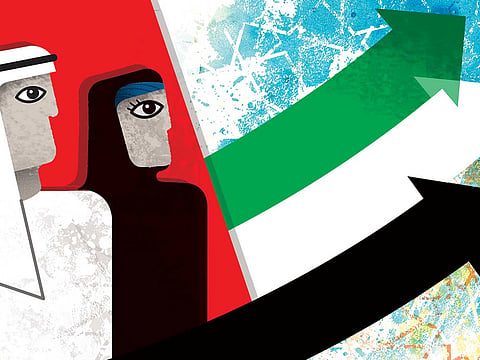The UAE momentum in Gulf history
No other regional socio-economic model is as attractive as the one that exists in this country

Despite the low oil price, the preoccupation with the war in Yemen and the ongoing regional tensions, all vital signs show that the momentum is firmly on the side of the UAE. This Arab Gulf state has assiduously maintained its upward trajectory since 1971, grown more confident over the years, made the impossible achievable and is prepared for the daunting challenges of the 21st century.
The UAE took a number of daring steps lately to keep its momentum going full blast. Two weeks ago, the Minister of State for Financial Affairs, Obaid Humaid Al Tayer, officially announced that the country is now fully ready to introduce the long-awaited value added tax (VAT) by 2018. The VAT is needed to diversify the federal government budget and prepare for the post-oil economy.
Late last year, the UAE took a major step to dismantle 40 years of energy subsidies basically to boost its overall finances and cut its emission rate. Interestingly, the UAE started 2016 by introducing the most sweeping government reorganisation since its inception in 1971. The principle intention is to top the world in happiness, tolerance and women’s empowerment.
On top of these recent measures, the UAE’s momentum gained a huge boost with its preparation for Expo 2020, the expected launch of the Hope Mars probe in 2020 and the near-completion of the first reactor of Barakah nuclear power plant, which is firmly on track for a 2017 start.
And if this is not enough to prove that the UAE momentum is in full blast, His Highness Shaikh Mohammad Bin Rashid Al Maktoum, Vice-President and Prime Minister of the UAE and Ruler of Dubai, announced at the Government Summit last month that the UAE intends to invest some Dh300 billion to prepare for the post-oil economy. In his recent article, ‘Key to Shaping the UAE’s Future’ he declared that “the UAE is a young country that will invest heavily in its youth and empower them precisely because they are the future”.
He also said that the country is exploring what life would look like in a post-oil economy. For it is not enough to learn lessons from the past and present but “we want to learn lessons from the future too”.
Over the past 45 years, the UAE has gone from a very modest beginning with hardly any regional or global visibility and near-zero influence in 1971 to a globally visible, regionally active and universally recognised trendsetter for the rest of the region in 2016. The country with a population of 260,000, with a $200 million (Dh735.6 million) gross domestic product and $1,000 per capita income in 1971 (among the bottom-20 worldwide at the time), is now a nation of 9.5 million people, with a $400 billion economy and a per capita income of more than $60,000 in 2016 (among the top ten in the world).
Amazingly, the UAE of 1971 was nearly behind most countries in the region in key developmental indicators. Most countries were ahead of the UAE as it looked up to Bahrain, Kuwait, Lebanon, Egypt and even Sudan for guidance. In 1960, all that Dubai wanted to be was another port of Basra, which was called the Venice of the East at the time.
Fast forward to 2016, where the UAE has left everyone behind. Bahrain, Kuwait, Lebanon and the rest now look up to the UAE, which now stands tall in a league by itself. Its institutions, infrastructures, companies, free zones, smart cities, universities, private sector competitiveness, tolerant social environment, business community and its women are the real forces driving the country’s momentum as a leading soft power of the 21st century.
The story of the past 45 years summarised the magnitude of the UAE momentum. No other country today commands as much admiration as the UAE. No other regional socio-economic model is as attractive as the UAE model. No other Arab capital is visited and consulted by world leaders on regional issues as Abu Dhabi. And certainly, no other Middle Eastern and North African city is as global and glamorous as Dubai — the undisputed commercial capital of the Arab world, where more than 50 per cent of regional foreign trade passes through the Jebel Ali Port.
Surely, the UAE momentum is not short of problems. The country faces some key challenges. Security and stability are the top concerns. Political modernisation is another formidable challenge. The country’s demography is a serious issue. Keeping the momentum and maintaining the lead in the 21st century has never been an easy endeavour.
In light of these challenges, the often-asked question is whether the UAE can sustain the momentum? The simple answer is a big ‘yes’. The UAE has dealt with these and other challenges since its inception and kept the momentum ticking. But more significantly, the UAE momentum is not merely driven by the past, but is forward-looking.
The UAE knows exactly where it wants be in 2021 — land on Mars. It also knows precisely where it will be heading in 2030 — the first post-oil economy in the Gulf. The country has a clear vision for 2050, when it will export its last barrel of oil. How more sustainable can it get!
With the current momentum solidly on its side, no one should doubt that the 21st century, at least the first half of it, is going to be the UAE’s century.
Dr Abdulkhaleq Abdulla is professor of Political Science, chairman of the Arab Council for Social Sciences, theacss.org and a visiting Senior Fellow at London School of Economics. You can follow him on Twitter at twitter.com/Abdulkhaleq_UAE.



